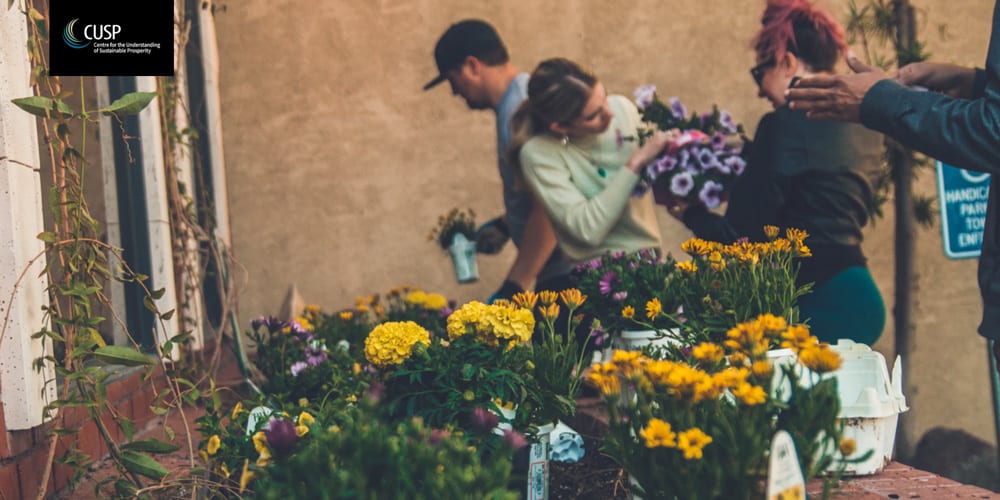Values and goals: Can we intervene to reduce materialism?
In order to live well within the earth’s limits we need to prioritise ways of living that enable us to have more fun with less stuff. This will inevitably require an end to the pursuit of ever more material possessions as a means of acquiring ‘the good life’. Given the fact that people who prioritise materialistic pursuits are consistently found to have lower wellbeing and higher ecological footprints, our research asked whether it is possible to intervene to reduce materialism?

Materialism can be conceived of as a value-orientation and a goal-orientation. Our values are our beliefs about what is important and what makes a good life. They act as guiding principles that influence our choices in all aspects of our lives. Someone with materialistic values might believe that the possessions they own are an important symbol of success and that life is better the more you can afford to buy. Materialism can also be conceived of as a goal-orientation. Whereas values can be relatively unconscious beliefs that guide our choices and behaviours, goals are more intentional. Goals involve setting a chosen direction for specific aspects of our lives and practical plans to achieve them. Having goals to strive for and making progress towards them is very important for our sense of wellbeing. They give us a sense of purpose and a reason for being, adding structure and meaning to our daily lives. But not all goals lead to better wellbeing. The achievement of materialistic goals tends to lead to a temporary, short lived boost in happiness that offers no real nourishment to long term wellbeing. Individuals who consistently prioritise materialistic goals are therefore more likely to display indicators of psychological ill-being such as loneliness, eating disorders, depression and anxiety.
The daily choices we make based on our value and goal orientations have a profound impact not just on our own wellbeing, but also on our communities and our environment. Aspiring to materialistic goals drives people to put the acquisition of material goods centre-stage in their lives. It becomes ever more important to have the latest clothes, make-up, phones and technology, then later in life the big house, the expensive car and the luxury holidays. But to continue consuming as those of us in much of the global north do, relies on the illusion of infinite resources. The increasingly short lifespan of trends and the speed of technological advancements means that our prized possessions quickly become either technologically or psychologically redundant, a source of embarrassment even, turning them into waste.
Research confirms that people who prioritise materialistic values and goals for wealth, image and status are likely to consume more and to have substantially higher ecological footprints than those who don’t. Studies have found that people’s values and goals have become increasingly materialistic since the 1970’s and it is not hard to see why in our advertising saturated culture that portrays a route to happiness paved by what you earn, what you own and how you look.
So is it possible to intervene to shift people away from Materialistic values and goals even in western, consumerist societies? In collaboration with environmental charity Global Action Plan and a team of international researchers, our research put this question to the test. We designed an intervention that aimed to reduce materialism, using strategies rooted in values and goal theories. Values and goals exist in systems and have opposing values and goals that operate like a bit like a seesaw. When one set are strengthened, the opposite set weaken. Materialistic values cluster around self-interest values e.g. the personal accumulation of wealth and having higher status relative to others. The opposing values are called self-transcendence values, which means having a focus beyond the self, e.g. helping others and protecting nature. We hypothesised that if we could encourage participants to think beyond themselves and have a positive effect on others, this would weaken their materialistic values. The opposing set of goals to materialistic goals are “intrinsic” goals for personal growth, good relationships and contributing to one’s community so we hypothesised that encouraging participants to focus on intrinsic goals should also weaken their materialistic goal orientation.
We designed the “Goals for Good” course, a 3-session intervention that asked participants to set goals for themselves using the 5 ways to wellbeing; Connect, Keep Learning, Be Active, Take Notice and Give, as a means of encouraging intrinsic goals. We then asked them to consider how they could tweak their goals to have a positive impact on other people or the planet, thus activating their “beyond self” values. You find out more about the rationale behind Goals for Good in this short animation. One participant, Paddy, set a goal to start volunteering offering “cocktails in care homes” enabling him to “give” (one of the 5 ways to wellbeing) and have a positive impact on others. Watch Paddy talk about his goals in this short video.
We delivered the course to participants in the UK, Italy and Hungary and compared the impact on their levels of materialism to participants who undertook a control course where they learnt strategies to achieve any goals they wanted to choose. We found that participants in the Goals for Good intervention had a reduced materialistic goal orientation which was maintained 2 months after course had finished. Participants in the control course saw no changes in their materialism. So did we shift materialistic values? Well ok not significantly but they did start to shift in the less materialistic direction. Previous research has shown that sometimes our values are a bit slower to catch up with our conscious life changes, so given more time, perhaps they might have tipped over that .05 p value!
So can we intervene to reduce materialism? Yes. We can consciously choose goals that help us build resilience to the often tempting sugar highs of materialism by nourishing ourselves with goals that truly enhance our wellbeing. As one participants said: “If I’d gone out and bought a new phone I’d feel good for the next couple day but then it’s not new anymore, whereas if you’ve done something good with your time and made an impact on someone, you know you’ve made a real difference to that person”. Yet another person finding out that less stuff really is more fun!
Want to test this out in in your school or workplace? You can access our free Goals for Good toolkits at the Global Action Plan website. A recently published journal article is available via our publications page.



